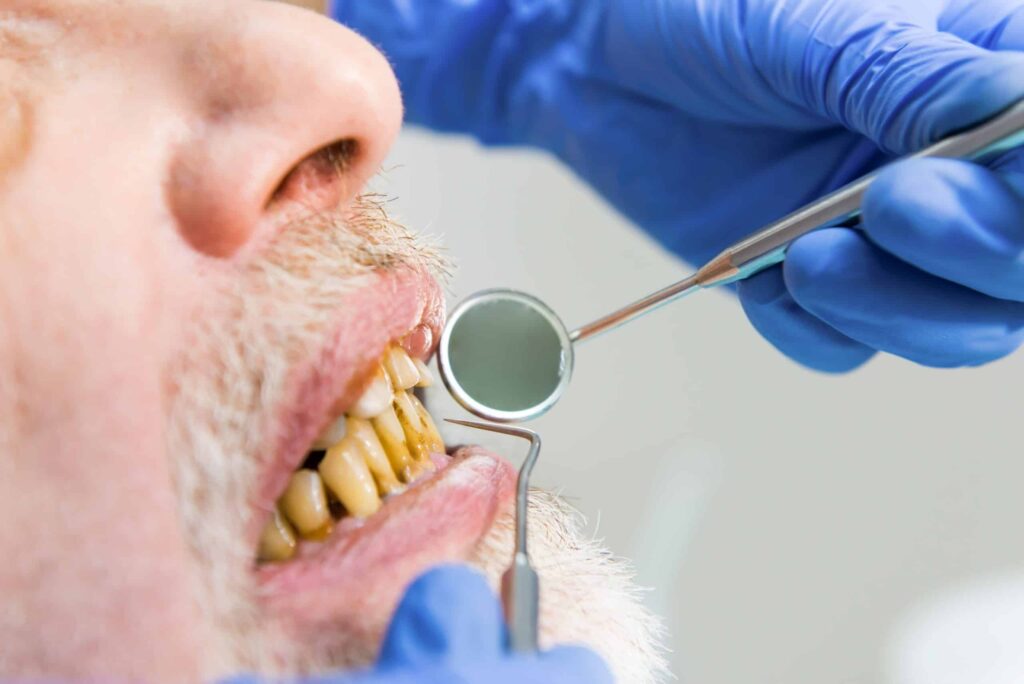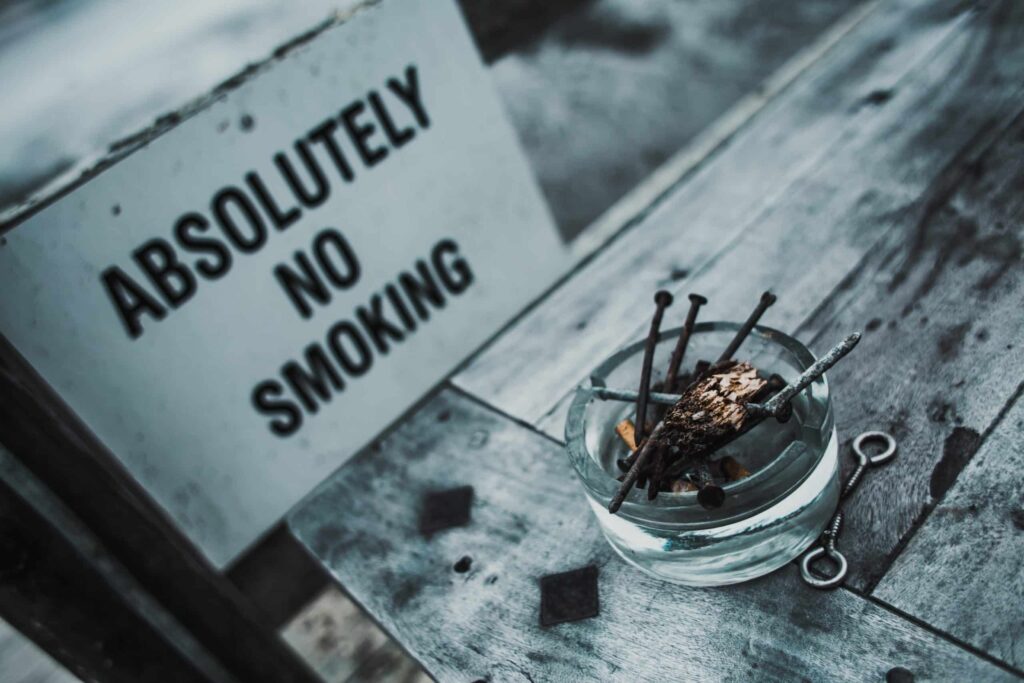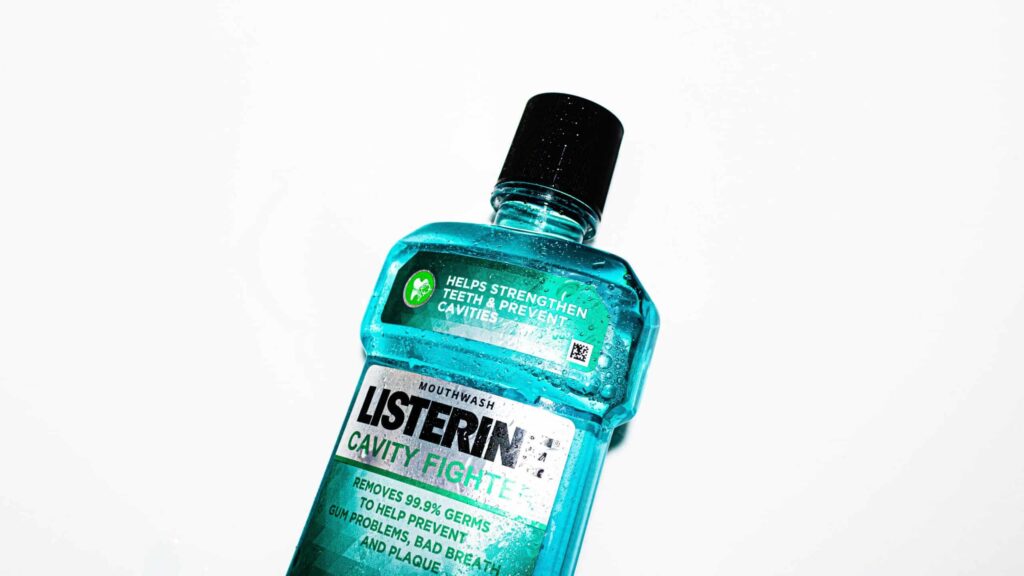Many life events frequently require you to be in close contact with another individual, regardless of whether it’s a mere conversation, interview, meeting, or and gathering. If you have bad breath (halitosis), it can affect the circumstances and cause you great embarrassment.
Breath odor affects everyone at a given moment. Odor can come from the teeth, mouth, or due to an underlying health condition.
Bad breath odor can be a short-term issue or a chronic condition. Roughly 50% of adults have bad breath in their life, according to the American Dental Association.

What Are The Symptoms of Breath Odor?
Bad breath odors vary depending on the origin or the root cause. Some people are overly concerned with their breath, albeit they have hardly any mouth odor, whereas others have halitosis and yet are not aware of it. Since it’s hard to judge how your own breath smells, ask a relative or good friend to verify your bad breath issues.
Besides a bad smell, you may also discern an awful taste in your mouth. If the taste is a result of an underlying disease and isn’t due to food stuck between teeth, it may not disappear — regardless if you brush your teeth and use mouthwash.
What Causes Bad Breath?
Food
Food is the main cause of bad odors that come from the mouth. Foods like fish, cheese, spicy foods, onions, garlic, acidic drinks like coffee can leave a lingering stench. Usually, the odor is temporary.
Other foods may get trapped in the teeth, stimulating bacteria and dental plaque buildup, which triggers bad breath odor.
Carbohydrates perform essential roles in our bodies, and if your food is low in carbs, it can result in bad breath. When the body doesn’t receive adequate carbs because of a harsh diet, this can create changes to your body’s metabolism which can cause bad breath.
Sometimes, high-protein foods are stressful for your body to metabolize and are likely to emit sulfurous gases when they don’t digest.
Poor Dental Hygiene
Another huge cause of bad breath is poor oral care or hygiene. The combination of decaying food and the bacteria in your mouth causes an offensive smell. If you aren’t brushing and flossing your teeth properly regularly, the food remains stuck between and associated plaque can start to smell foul.
Dry mouth
A dry mouth can manifest if you don’t produce plenty of saliva. Saliva helps cleanse your mouth and prevents odor. If you sleep with your mouth open, have a salivary gland condition, or take certain prescriptions, such as those that treat urinary conditions and high blood pressure, dry mouth can be a predicament.
Tobacco products
Smoking produces its offensive mouth odor. Oral tobacco users and smokers tend to have periodontal disease, another root of bad breath.

Medication
Many prescription drugs come with an after effect of dry mouth. When saliva production lowers, when your mouth is dry, the conditions for odor-causing bacteria prosper. Any long period with a cotton mouth can lead to uneasiness and cause bad breath. Furthermore, certain medications, when absorbed in the body, release chemicals that can be transported through your bloodstream to your breath.
Gum disease
Gum disease, or periodontal disease, occurs when you don’t get rid of plaque immediately from teeth. After a while, plaque solidifies into tartar. You can’t eliminate tartar by brushing, and attempting to do so further inflames your gums.
Tartar may create small cracks, or pockets, to materialize in the space between the teeth and gums. Food, bacteria, and dental plaque can accumulate in the holes, resulting in a strong odor.
Health problem
Some health conditions may be linked to bad breath including:
- stomach or digestion problems
- lactose intolerance
- acid reflux (GERD or gastroesophageal reflux disease)
- diabetes
- postnasal drip
- bronchitis
- thrush
- tonsil stones (tonsilloliths)
- influenza (flu)
- common cold
- sore throat (pharyngitis) and other throat infections
- pneumonia
- sinus infections
- some liver diseases or kidney diseases
Treatment : How To Get Rid Of Bad Breath?
To mitigate bad breath, help prevent cavities and reduce your risk of periodontal disease, regularly follow good oral care. Additional treatment for bad breath can vary, depending on the root cause. In case your bad breath is considered to be triggered by an underlying medical condition, your dentist will probably refer you to your physician.
Most often, a dentist will prescribe toothpaste and mouthwashes that contain oxygenating agents like sodium chlorite or chlorine dioxide to counterbalance volatile sulfur compounds and help regulate odor-causing bacteria in the mouth.
Also, your dentist will recommend a saliva replacement to moisten the mouth all day if you are suffering from mouth dryness,
If you have periodontal disease, you may be transferred to a periodontist or gum specialist. Gum disease can cause gum recession, leaving deep openings that steep with odor-causing bacteria. In some cases, only professional cleaning eliminates these bacteria. Your dentist might also suggest having a damaged tooth restoration, a seedbed for bacteria.
How To Prevent Breath Odor?
Practice good oral hygiene
Brush twice a day with fluoride toothpaste to get rid of food remains and plaque. Brush teeth every after a meal.
If you can’t brush after you eat, give your mouth a good rinse with water to unstrain and free those stuck particles. Rinse with an antibacterial mouthwash twice a day.
Your tongue grips bacteria, so thoroughly brushing it may lessen odors. People who have a white tongue from a substantial bacteria overgrowth (due to dry mouth or smoking) may adopt a tongue scraper. Or use a toothbrush with a built-in tongue cleaner.
Replace your toothbrush every 2 to 3 months or after contracting a disease. Dentures must be taken off at night and cleaned carefully before being put back in your mouth the following morning. Clean braces and retainers as instructed by your dentist.

Avoid Certain Food
Avoid garlic, onions, and spicy food. Lessen alcohol and coffee consumption. Eating a breakfast that has rough foods can help clean the back of the tongue.
Additionally, avoid eating too many processed foods that contain refined carbohydrates like ice cream, sweets, cakes, and cookies. Sugary foods are also associated with bad breath.
Avoid dry mouth
Drink a sufficient amount of water. Chewing gum, ideally sugar-free, can help spur the production of saliva. If you have chronic dry mouth or take medicines that cause you to have dry mouth, a doctor may recommend an over-the-counter saliva substitute.
Quit smoking and avoid tobacco products
If you ever asked for another reason to stop, here’s an obvious one: smoking contributes to halitosis. Studies have revealed that smokers or tobacco users are at greater risk of having gum disease and dry mouth.
See your dentist regularly
See your dentist regularly, generally every 6 months, for checkups and to ensure braces or dentures are correctly fitted and cleaned. They will perform an oral exam and expert teeth cleaning and will be able to detect and address dry mouth, gum disease, or other conditions that may be the root of bad breath.
If you can’t find the underlying cause of your bad breath, it’s time to set foot in and see your dentist in Houston, TX. Schedule an appointment with our dentist wherever you are, as early as possible. The earlier you treat your case, the quicker you can again enjoy social interactions and get your oral health in the right direction.
FAQ:
Why do I have bad breath all the time?
Brushing your teeth is not always the cure for bad breath. If the root cause isn’t in your mouth or if it’s linked to mouth dryness, brushing may not remove it. Consult your doctor to know the exact cause.
How do I stop smelly breath?
- Brush your teeth after you eat.
- Brush your tongue.
- Floss at least once a day.
- Clean dentures or braces.
- Avoid dry mouth.
- Change your diet.
- Replace toothbrush every 2-3 months.
- Schedule regular dental checkups.
What causes bad breath even after brushing?
If you still experience bad breath after brushing, there could be food remnants on your tongue. Try a tongue scraper or try brushing your tongue with your toothbrush to solve this problem and stop bacteria buildup.
Can bad breath come from the stomach?
GERD (gastroesophageal reflux disease) or chronic reflux of the stomach can be linked to bad breath.
Can bad breath be cured?
In general, bad breath can be cured and stopped with decent oral hygiene. It is seldom fatal, and the prognosis is favorable. But bad breath may be a complication of an illness that needs to be treated.
Does apple cider vinegar help bad breath?
Apple cider vinegar is a good alternative for balancing the PH levels in your mouth, which suggests it can favorably get rid of bad breath. You can take this on its own or add a few spoonfuls to water.
